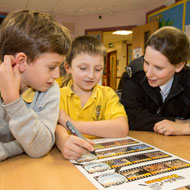
New research conducted by the Scottish animal welfare charity, SPCA, and the University of Edinburgh has revealed that pets have a positive impact on children’s mental health.
The research, published in the International Journal of Environmental Research and Public Health, indicated that encouraging children to care for pets elicits high emotional attachments between the two. This attachment between child and pet has been shown to produce positive effects on a child’s emotional wellbeing.
The study found that girls tend to be more attached to their pets than boys, and that more children were attached to cats and dogs over other family pets. The study also showed that a child’s background has little influence on their attachment to a pet, and that most children developed these emotional bonds with their pets, regardless of context.
Head of education and policy at the Scottish SPCA, Gilly Mendes Ferreira, said: “We actively encourage and promote positive pet care behaviour through our ground-breaking free education programme in Scottish primary schools which last year spoke to around 300,000 [pupils].
“Our interactive programme encourages children to think about what animals need and they learn how they can be responsible towards animals they come across including their pets.”
Roxanne Hawkins, PhD student in clinical and health psychology at the University of Edinburgh, said; “This research focused on the emotional and friendship aspects of childhood attachment to pets and showed that children viewed their pets as their best friend, reporting that they would be lonely without them and that they felt that their pet knew when they were upset and tried to comfort them.”
Dr Jo Williams, senior lecturer in clinical and health psychology from the University of Edinburgh, said: “Our finding that children are highly attached to their pets is important because attachment to pets has a positive impact on children’s mental health and wellbeing. By encouraging children to take an active caring role for pets within families we can promote pet attachment, child wellbeing and animal welfare.”
Image © Scottish SPCA



 The Veterinary Medicines Directorate (VMD) is inviting applications from veterinary students to attend a one-week extramural studies (EMS) placement in July 2026.
The Veterinary Medicines Directorate (VMD) is inviting applications from veterinary students to attend a one-week extramural studies (EMS) placement in July 2026.